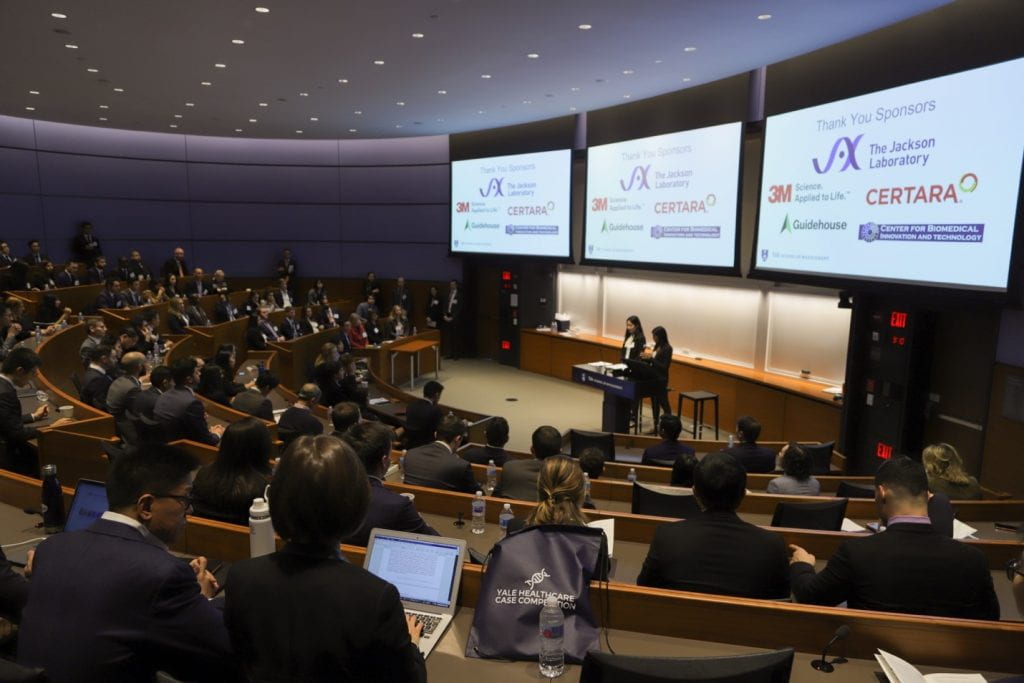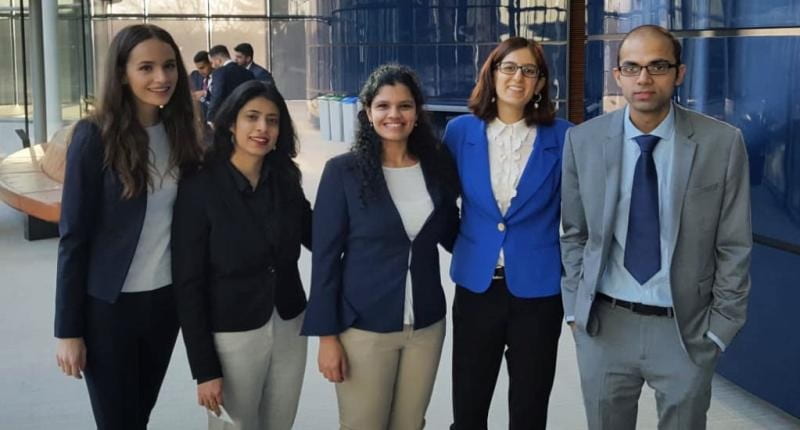Photo Description: Students from universities across the country gather for the start of the Yale Healthcare Case Competition 2020.
Photo Credit: Yale School of Management, Harry Kim, MPH 2020
On February 22nd, four MBA students and one PhD student in biology represented the Kelley School of Business Center for the Business of Life Sciences at the Yale Healthcare Case Competition in New Haven, Connecticut. The competition is an annual graduate student-run competition focused on healthcare and biotechnology.
Photo Description: The Yale Case Competition team from Indiana University (IU) included (from left to right) Megan Gee (MBA), Riddhi Sood (Biology PhD), Viji Sundararaman (MBA), Cullie Poseria (MBA) and Rahul Mishra (MBA).
The event brings together interdisciplinary teams of up to five students from multiple professional schools and programs to solve the most challenging problems in the field today. This year’s topic was on a new gene therapy and tool built on CRISPR technology, and past competitions have also been on cutting-edge topics like precision medicine software, wearables, immunotherapy and next-generation sequencing for infectious disease diagnostics.
In addition to giving students an opportunity to tackle a business case in one week’s time, the competition also gives students a chance to network with judges and sponsors during various sessions including a cocktail reception at the conclusion of the event. This year’s sponsors included The Jackson Laboratory, 3M, Charles River Associates, Guidehouse, Certara, Synpulse Management Consultants, the Yale Center for Biomedical Innovation and Technology and the Yale Graduate and Professional Student Senate.
Some team members offered their thoughts about the experience.
Q: What were the benefits of participating in the Yale Healthcare Case Competition?
Megan Gee: “I learned way more about the product life cycle for pharma and gene therapy than I thought I would ever learn. I think my favorite part was watching the other teams and seeing how they interpreted the same material we got.”
Cullie Poseria: “I was surprised how much I learned about CRISPR, biotechnology and gene therapy in just one week. This was a real case written by some Yale students in collaboration with personnel at The Jackson Laboratory. I liked that this competition has new technology as the topic, as that makes it more exciting to work on. Another benefit is that participants can network with other students and sponsors during the day.”
Riddhi Sood: “Yale’s healthcare competition is a great platform to broaden any MBA/STEM student’s perspective. As a cancer biologist, this was a once-in-a-lifetime opportunity. I have never heard our faculty talking about the commercialization process of a product discovered in the lab so being able to participate in such a platform was a great learning opportunity for me.”
Q: What was the most interesting thing you learned during the competition?
Megan Gee: “I thought the most interesting thing I learned was about various payors’ responses to curative therapies. The judges brought it up during our question and answer portion with other teams and referenced the hepatitis drugs.”
Cullie Poseria: “Honestly, the biggest thing I learned was around leading a team. This competition was tough because we had to prepare a recommendation in the week before finals. The challenge was how to coordinate schedules, debate ideas and formulate a strategy with a team that had such a diversity of thoughts. I learned a lot about myself as a leader and how to keep things moving.”
Riddhi Sood: “This competition pushed the boundaries of what I already knew. Some examples are: I knew what works in science, but does it make money? I knew how a technology works in the lab, but how do we scale it up?”
Vijayalakshmi Sundararaman: “Learning to take a gene therapy from the lab to market was a very exciting and challenging experience. I learned a lot about the value chain, the key stakeholders involved (such as big pharma, non-profit institutions, etc) and what each of them values most, as well as about epigenetics and how CRISPR works. It also gave me great insight into how the US healthcare system works as it is so different from how healthcare systems work in India where I am from. I must also say this project made me greatly appreciate human biology and the scientific community. Overall it was intriguing on many levels, and I am thankful to my teammates, the Kelley life sciences community and Yale University for giving me such an opportunity.”
Q: What thoughts would you share with future teams?
Megan Gee: “I think it’s very important for groups to be flexible and open to hearing ideas from other people.”
Cullie Poseria: “Participants must be realistic and upfront about expectations and what they want out of the competition. There were vocal team members going after placement in the competition, but I don’t think they realized what their schedules would be like during this time of year once the competition dates finally approached. Some of us had multiple commitments, which made it hard to balance the workload and left us completing the recommendation till the moment we submitted our presentation. If future students want to commit to this competition, they should think seriously about their goals, objectives and the amount of time they can give to their team.”
Riddhi Sood: “There were a few tips I had:
- Rather than re-inventing the wheel, build upon things your team already knows well. It is also important to play to the team’s strengths when in a time crunch.
- Presenting is an art. There is a strategy to not overcrowding the presentation space and not being afraid to show off and go in-depth with the numbers in the presentation!
- I recommend speaking with experts in the field of the case. This helped us quickly do our research and cross check our recommendations for practicality in terms of implementation.
- Team dynamics is important. All the team members need to get on the same page as soon as possible.”
Vijayalakshmi Sundararaman: “Each case competition is so different, but irrespective of the timelines involved and the case prompt given, it is important to be diligent and thorough with research. It not only helps shape a cohesive story around the presentation, but it also builds credibility while broadening the whole learning experience. Spend ample time upfront with your teams in nailing down the strategy. Put in extra hours early on, so you have time to practice your presentation and think ahead about probable questions from the judges. These are big differentiators!”
The team was grateful for the chance to represent IU during this national competition and for the Center for Business of Life Sciences’ coverage of travel expenses so they could participate. More than 50 teams applied for the competition and 25 were accepted to present their recommendation, so it was an honor for Indiana University’s team to participate. The winning teams after two rounds of presentations were from Johns Hopkins, who won $5,000, Cornell, winning $2,000 and Yale, who won $1,000.


Leave a Reply